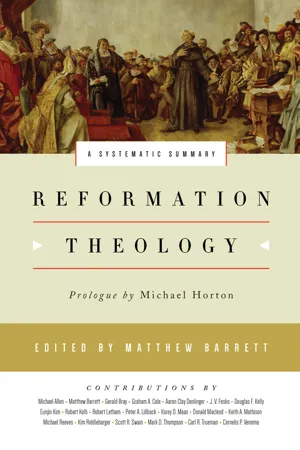
- English
- ePUB (mobile friendly)
- Available on iOS & Android
About this book
Five hundred years ago, the Reformers were defending doctrines such as justification by faith alone, the authority of Scripture, and God's grace in salvation—some to the point of death. Many of these same essential doctrines are still being challenged today, and there has never been a more crucial time to hold fast to the enduring truth of Scripture.
In Reformation Theology, Matthew Barrett has brought together a team of expert theologians and historians writing on key doctrines taught and defended by the Reformers centuries ago. With contributions from Michael Horton, Gerald Bray, Michael Reeves, Carl Trueman, Robert Kolb, and many others, this volume stands as a manifesto for the church, exhorting Christians to learn from our spiritual forebears and hold fast to sound doctrine rooted in the Bible and passed on from generation to generation.
Tools to learn more effectively

Saving Books

Keyword Search

Annotating Text

Listen to it instead
Information
Table of contents
- Cover
- Newsletter Signup
- Endorsements
- Title Page
- Copyright
- Dedication
- Contents
- Prologue What Are We Celebrating?
- Abbreviations
- Introduction
- 1 The Crux of Genuine Reform
- Part 1 Historical Background to the Reformation
- 2 Late- Medieval Theology
- 3 The Reformers and Their Reformations
- Part 2 Reformation Theology
- 4 Sola Scriptura
- 5 The Holy Trinity
- 6 The Being and Attributes of God
- 7 Predestination and Election
- 8 Creation, Mankind, and the Image of God
- 9 The Person of Christ
- 10 The Work of Christ
- 11 The Holy Spirit
- 12 Union with Christ
- 13 The Bondage and Liberation of the Will
- 14 Justification by Faith Alone
- 15 Sanctification, Perseverance, and Assurance
- 16 The Church
- 17 Baptism
- 18 The Lord’s Supper
- 19 The Relationship of Church and State
- 20 Eschatology
- Contributors
- Name Index
- Subject Index
- Scripture Index
Frequently asked questions
- Essential is ideal for learners and professionals who enjoy exploring a wide range of subjects. Access the Essential Library with 800,000+ trusted titles and best-sellers across business, personal growth, and the humanities. Includes unlimited reading time and Standard Read Aloud voice.
- Complete: Perfect for advanced learners and researchers needing full, unrestricted access. Unlock 1.4M+ books across hundreds of subjects, including academic and specialized titles. The Complete Plan also includes advanced features like Premium Read Aloud and Research Assistant.
Please note we cannot support devices running on iOS 13 and Android 7 or earlier. Learn more about using the app